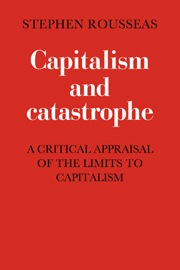Preface
Published online by Cambridge University Press: 05 November 2011
Summary
This book is intended as a critical essay on the nature of advanced capitalism. Its origin was a paper written for a conference held at Rutgers University in April 1977 on “Post-Keynesian Theory: The Unexplored Issues.” The conference was a gathering of economists who identify themselves with what has come to be known as the post-Keynesian revolt. Among the first to mount the barricades in the early sixties was Joan Robinson. Her attack on “pre-Keynesian economists after Keynes,” to use her well-suited phrase, was devastating. She questioned not only the meaning of ‘capital’ in bastardized Keynesian theory, but also its use in a neoclassical theory of income distribution where the rewards of labor and capital are based on their relative contributions to the total output of goods and services under competitive market conditions. She accused them, in effect, of pushing the ideological bias of their neo-neo-classicism, namely, the ideology of the status quo, into the background while parading stage front in the pseudoscientific garments of a neutral, wertfrei economics. She was particularly severe on neoclassical equilibrium analysis and its use of static comparisons in logical time to analyze what is essentially a process taking place in historical time – where the past is opaquely dark, the future is unknown if not unknowable, and the present is the stomping ground of the intellectual mandarins.
- Type
- Chapter
- Information
- Capitalism and Catastrophe , pp. ix - xivPublisher: Cambridge University PressPrint publication year: 1979



